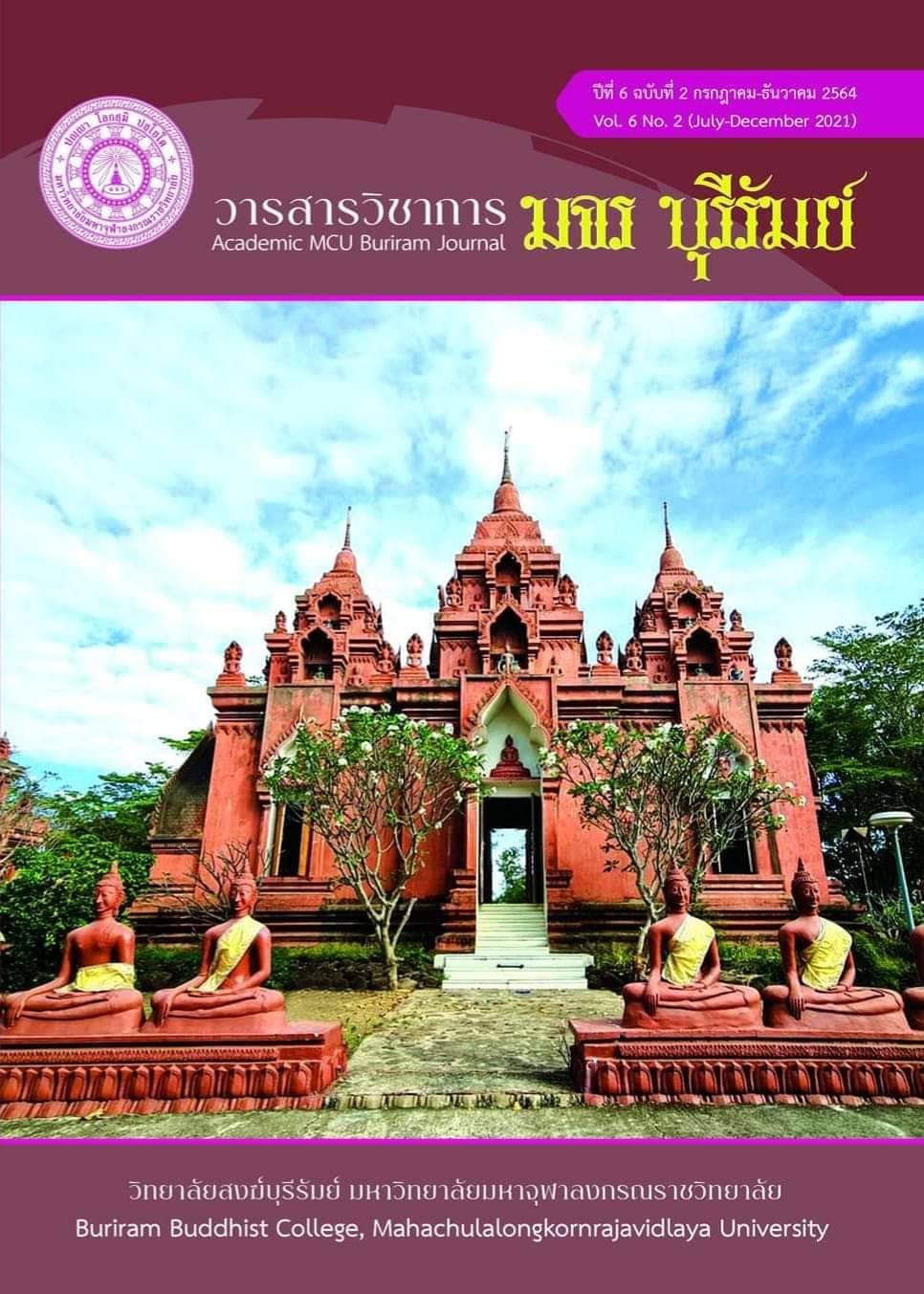A Study of the Concept of Mind in Theravada Buddhist Philosophy and Western Idealism
Keywords:
Concept of Mind, Buddhist Philosophy, Western IdealismAbstract
This research aimed to study the concept of mind in Theravada Buddhist philosophy, to study of the concept of the mind in Western idealism and a comparative study of the concept of mind in Theravada Buddhist philosophy with Western idealism. Researcher study the datum from documentary and concerning research, then analyzed the datum and presented by analytic description.
The research results were found:
In Theravada Buddhist philosophy, citta refers to thoughts, nature that knows emotions. There is always a perception of both external and internal objects. The way of the mind is a modified form (Samkhara-dharma) has the appearance of a continuous, uninterrupted until it seems that the mind exists in its absolute existence, never quenching, that the mind or the consciousness has a nature to know. But the nature of the mind itself is not only known. There are cetasikas, which are feelings (vedana), perceptions (sanna), and mental formation (sankhara) that arise and cease with the mind. As for the Bhavamkacitta (unconscious minds), it is responsible for the succession of birth and becoming.
In Western idealist philosophy, the mind is the only truth. Matter is only a phenomenon of the mind. Values are real things, such as goodness, beauty, right and wrong. The mind is eternal, it is real, not fictitious. It is not up to the satisfaction of the judges. There is only one mind, the absolute, and it is divided into three phases as the original mind is the pure mind, the paradoxical mind manifests itself as matter and the synthetic mind is the self-consciousness as the mind. Even though we humans are composed of body and mind. But the important part that controls the body or forces the body to act out different behaviors is the mind.
This research compares four issues, namely the nature of the mind, relationship between body and mind, free will and immortality of mind. In terms of similarity, Theravada Buddhist philosophy and Western idealism view the mind as abstract, no anatomy, shapeless, weightless, colorless, odorless, edible and believe that life consists of body and mind. When the body decays or dies, the mind is still not destroyed by the body. In terms of differences, Theravada Buddhist philosophy considers the mind arise, appear and disappear all the time. The mind is under the trinity of impermanence (anicca), suffering (dukkha) and selflessness (anatta). Western idealism views the mind as the absolute and immortal aspect because it is the spirit derived from the Absolute Being or God.
References
มหาจุฬาลงกรณราชวิทยาลัย. (2535). พระไตรปิฎกภาษาไทย ฉบับมหาจุฬาลงกรณราชวิทยาลัย. กรุงเทพมหานคร: โรงพิมพ์มหาจุฬาลงกรณราชวิทยาลัย.
กีรติ บุญเจือ. (2528). แก่นปรัชญากรีก. กรุงเทพมหานคร: ไทยวัฒนาพานิช.
จำนงค์ ทองประเสริฐ. (2534). ปรัชญาตะวันตกสมัยใหม่. พิมพ์ครั้งที่ 2. กรุงเทพมหานคร: มหาจุฬาลงกรณราชวิทยาลัย.
บรรจบ บรรณรุจิ. (2533). จิต มโน วิญญาณ. พิมพ์ครั้งที่ 3. กรุงเทพมหานคร: จรูญการพิมพ์.
ประพจน์ อัศววิรุฬหการ และ สุวรรณา สถาอานันท์. (2542). “จิตใจ” ในคำ: ร่องรอยความคิดความเชื่อไทย. พิมพ์ครั้งที่ 3. กรุงเทพมหานคร: จุฬาลงกรณ์มหาวิทยาลัย.
พระธรรมโกศาจารย์ (ประยูร ธมฺมจิตฺโต). (2552). ปรัชญากรีก บ่อเกิดภูมิปัญญาตะวันตก. พิมพ์ครั้งที่ 7. กรุงเทพมหานคร: สำนักพิมพ์ศยาม.
พระพุทธโฆษาจารย์. (2548). วิสุทธิมรรค ภาค 2 ตอน 1. พิมพ์ครั้งที่ 10. กรุงเทพมหานคร: มหามกุฏราชวิทยาลัย.
พระพรหมคุณาภรณ์ (ป.อ.ปยุตฺโต). (2553). พจนานุกรมพุทธศาสตร์ ฉบับประมวลศัพท์. พิมพ์ครั้งที่ 6. กรุงเทพมหานคร: มหาวิทยาลัยมหาจุฬาลงกรณราชวิทยาลัย.
พระพรหมคุณาภรณ์ (ป.อ.ปยุตฺโต). (2545). พุทธธรรม. พิมพ์ครั้งที่ 20. กรุงเทพมหานคร: โรงพิมพ์ บริษัทสหธรรมิก.
วิทย์ วิศทเวทย์. (2520). ปรัชญาเบื้องต้น. กรุงเทพมหานคร: อักษรเจริญทัศน์.
วิธาน สุชีวคุปต์. (2558). อภิปรัชญา. กรุงเทพมหานคร: มหาวิทยาลัยรามคำแหง.
อดิศักดิ์ ทองบุญ. (2546). คู่มืออภิปรัชญา. พิมพ์ครั้งที่ 4. กรุงเทพมหานคร: ราชบัณฑิตยสถาน.
พระอนุทธเถระ. (2539). พระอภิธัมมัตถสังคหะ. อภิธรรมโชติกะวิทยาลัย มหาจุฬาลงกรณราชวิทยาลัย: โรงพิมพ์ห้างหุ้นส่วนจากัด ทิพยวิสุทธิ์.
จันทรัชนันท์ สิงหทัต. (2539). การศึกษาเปรียบเทียบแนวความคิดเรื่องจิตในพระพุทธศาสนาเถรวาทและ มหายานอินเดีย:ศึกษาเฉพาะกรณีพระสูตร พระอภิธรรม และลังกาวตารสูตร. วิทยานิพนธ์อักษรศาสตรมหาบัณฑิต. บัณฑิตวิทยาลัย: มหาวิทยาลัยมหิดล.
Downloads
Published
How to Cite
Issue
Section
License
ทัศนะและความคิดเห็นที่ปรากฏในบทความวารสารฉบับนี้ถือเป็นความรับผิดชอบของผู้เขียนบทความนั้น ไม่ถือเป็นทัศนะและความรับผิดชอบของบรรณาธิการ





